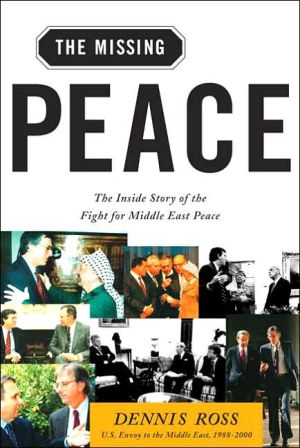The Missing Peace: The Inside Story of the Fight for Middle East Peace
"The definitive and gripping account of the sometimes exhilarating, often tortured twists and turns in the Middle East peace process, viewed from the front row by one of its major players."—Bill Clinton\ The Missing Peace, published to great acclaim last year, is the most candid inside account of the Middle East peace process ever written. Dennis Ross, the chief Middle East peace negotiator in the presidential administrations of George H. W. Bush and Bill Clinton, is that rare figure who is...
Search in google:
"The definitive and gripping account of the sometimes exhilarating, often tortured twists and turns in the Middle East peace process, viewed from the front row by one of its major players."—Bill ClintonThe Missing Peace, published to great acclaim last year, is the most candid inside account of the Middle East peace process ever written. Dennis Ross, the chief Middle East peace negotiator in the presidential administrations of George H. W. Bush and Bill Clinton, is that rare figure who is respected by all parties: Democrats and Republicans, Palestinians and Israelis, presidents and people on the street in Jerusalem, Ramallah, and Washington, D.C.Ross recounts the peace process in detail from 1988 to the breakdown of talks in early 2001 that prompted the so-called second Intifada-and takes account of recent developments in a new afterword written for this edition. It's all here: Camp David, Oslo, Geneva, Egypt, and other summits; the assassination of Yitzak Rabin; the rise and fall of Benjamin Netanyahu; the very different characters and strategies of Rabin, Yasir Arafat, and Bill Clinton; and the first steps of the Palestinian Authority. For the first time, the backroom negotiations, the dramatic and often secretive nature of the process, and the reasons for its faltering are on display for all to see. The Missing Peace explains, as no other book has, why Middle East peace remains so elusive. The Washington Post - Glenn Frankel [Ross] served as midwife, babysitter, taskmaster and father confessor to a generation of Israeli and Palestinian leaders and negotiators. Ross -- and they -- struggled, exhaustively and sometimes nobly, and ultimately they failed. Now he has written an equally noble, exhaustive and, at times, exhausting 800-page account of the people and the process.
The Missing Peace\ Dramatis PersonaeEgyptJordanSyriaSaudi ArabiaPalestiniansIsraelisCopyright © 2004 by Dennis Ross
Ch. 1Why Israelis, Arabs, and Palestinians see the world the way they do15Ch. 2The road of Madrid46Ch. 3Rabin, presidential transition, the Syrian pocket, and Oslo88Ch. 4From Oslo to the Palestinian authority122Ch. 5The evolution of the Syrian talks137Ch. 6King Hussein fulfills his grandfather's legacy164Ch. 7The interim agreement188Ch. 8The Rabin assassination : would tragedy produce opportunity?209Ch. 9Was Asad up to it?216Ch. 10Could the peace process be saved?246Ch. 11Bibi wins : will peace lose?256Ch. 12The endless Hebron shuttle269Ch. 13One last push to settle Hebron293Ch. 14From breakthrough to stalemate323Ch. 15The 13 percent solution349Ch. 16Prelude to Wye398Ch. 17The Wye summit415Ch. 18Bibi surrenders to the right and loses the Israeli public460Ch. 19Great expectations for Barak495Ch. 20"Syria's my priority"509Ch. 21Asad's surprise536Ch. 22The rise and fall of the Israeli-Syrian deal549Ch. 23From stalemate to Camp David591Ch. 24The Camp David summit650Ch. 25The Denouements : from Camp David to the Intifada to the Clinton ideas712Ch. 26Learning the lessons of the past and applying them to the future759
\ From the Publisher"Important, voluminous and keenly balanced . . . Ross's analysis of the peace process is astute, but the real service he performs in this book is less in explaining the meaning of events than in setting the record straight."—Ethan Bronner, The New York Times Book Review\ "The Missing Peace is the definitive and gripping account of the sometimes exhilarating, often tortured twists and turns in the Middle East peace process, viewed from the front row by one of its major players, Dennis Ross. No one worked harder for peace than Dennis. He gave it everything he had and served our nation very well. Now he has provided us with a rich account of what happened that is essential to understanding both the past and the possible paths to the future." —President William J. Clinton\ "The Missing Peace is a brilliant behind-the-scenes account of history in the making. Only Dennis Ross could have written such a lively, provocative and insightful book. This definitive telling of a fascinating and tragic tale will be indispensable to any serious student of the Arab-Israeli dispute." —Madeleine Albright, former U.S. Secretary of State\ "I've never known anyone so deeply committed to the cause of peace in the Middle East as Dennis Ross. This book reflects not only that dedication but his brilliance in writing about it in a colorful and comprehensive way." —Warren Christopher, former U.S. Secretary of State\ "The Missing Peace is amazing narrative. Ross, who knows Mideast diplomacy better than any other American, does something essential if there is ever to be peace: quite simply, he tells the truth. In doing so, he dispells the myths that block a deal. This is the one essential book that should be read by everyone who cares about this crucial topic." —Walter Isaacson, President of the Aspen Institute and author of Benjamin Franklin: An American Life\ "Few Americans have had a more intimate involvement with the complex issues that divide the Middle East than Dennis Ross, as U.S. envoy and chief negotiator under two Presidents. The Missing Peace presents a candid, thoughtful and detailed picture of the process and the participants." —Dr. Henry Kissinger, former U.S. Secretary of State\ "Dennis Ross was at the heart of Israeli-Palestinian negotiations for twelve momentous and tumultuous years. He provides in fascinating detail his account of what happened and his reasoning as events transpired. He rendered a great public service as tireless negotiator and has done so again with this well-written and instructive book—a classic must-read for anyone interested in the Middle East." —George Shultz, former U.S. Secretary of State\ "The Missing Peace is imbued with wisdom, and it analytical content is vital in helping understand the complex facets of the Middle East. It is written with a mix of empathy and sadness, in character with the conflicting nature of the region." —Shimon Peres, former Israeli Prime Minister\ \ \ \ \ \ Glenn Frankel[Ross] served as midwife, babysitter, taskmaster and father confessor to a generation of Israeli and Palestinian leaders and negotiators. Ross -- and they -- struggled, exhaustively and sometimes nobly, and ultimately they failed. Now he has written an equally noble, exhaustive and, at times, exhausting 800-page account of the people and the process.\ — The Washington Post\ \ \ Publishers WeeklyThis is the ultimate insider's account of the roller-coaster ride of the Middle East peace process from 1988 to the breakdown of talks in 2001. More than anything else, Ross, the chief U.S. negotiator for Presidents Bush 41 and Clinton, has written an epic diplomat's handbook. We see the moves and countermoves on both sides, the preparation that goes into any statement or gesture, the backroom wheeling and dealing and the dance of language and meaning. Ross lays out, in painstaking detail, the "one step forward, two steps back" approach that finally led to such breakthroughs as the handshake on the White House lawn. He offers detailed accounts of Yitzhak Rabin's assassination, the rise and fall of Benjamin Netanyahu and a picture of Arafat "seeking to have it both ways... La-Nam (no and yes in Arabic)." Ross's critical eye paints a vivid picture of the very different characters and strategies of Arafat, Barak and Clinton, and what led to the failure at Camp David. While Ross lands in the blame-Arafat camp, he is not without criticism of Barak and Clinton. Tragically, for all those who follow this region, Ross's book does not present a hopeful picture; the litany of failures sounds like a broken record: "We left the region hopeful, but that hope was premature"; "Once again, however, our best-laid plans went awry." Sure to garner its share of controversy and media attention, this work of history in the making is essential reading for anyone interested in why we are where we are in the Middle East. Maps not seen by PW. (Aug.) Copyright 2004 Reed Business Information.\ \ \ \ \ Foreign AffairsNow Ross's book has added to the literature, covering in exquisite detail the history of Arab-Israeli negotiations from the preparations for the Madrid Conference in 1991 to the final hours of the Clinton presidency and the de facto end of the Oslo process in January 2001. Ross's own involvement in nearly every aspect of these events, his detailed personal notes on conversations, the candor with which he describes both events and personalities, and the fairness he displays in writing about many sensitive and contentious moments all combine to make The Missing Peace a major contribution to the diplomatic history of the twentieth century.\ \ \ \ \ Library JournalRoss was the U.S. government envoy to the Middle East peace process for 12 years, from 1988 to 2001. This memoir, based on his extensive notes and diaries, presents a detailed account of the considerable efforts made to achieve a viable settlement. Many of these efforts were not documented by the press; some were deliberately kept secret. Ross is very frank in pointing out failures and errors of judgment, including his own; neither side is blamed exclusively for the lack of success. While researchers will find this a valuable resource for its firsthand perspective, nonspecialists will likely be overwhelmed by the minute detail and the regular use of first names only when referring to other participants in the negotiations. They may turn instead to Madeleine Albright's recent Madame Secretary, which devotes three chapters to this topic, or to Charles Enderlin's Shattered Dreams, comparably detailed but a journalist's account (based on interviews with the participants) rather than an insider's. For academic and research collections. [See Prepub Alert, LJ 4/15/04.]-Marcia L. Sprules, Council on Foreign Relations Lib., New York Copyright 2004 Reed Business Information.\ \ \ \ \ Kirkus ReviewsWhy can't Palestinians and Israelis just get along? The answer, writes US diplomat Ross, has as much to do with timing as with any particularly felt enmity. When the Israelis are ready to deal, their neighbors are not and vice versa, so that "after the 1967 war Israel was ready to return nearly all the captured territories for peace, but the Arabs, guided by Nasser's ‘three no's,' were not ready to accept Israel, much less negotiate with it." Ross adds that the poor timing has not been helped by Palestinian leader Yasir Arafat, who is incapable of making any lasting peace with Israel-mostly, Ross suggests, because of Arafat's unwillingness to transform himself from revolutionary boss to statesman. Ross tracks efforts on both sides over a ten-year period in which he was active, as a negotiator and go-between, at nearly every level of deal-making: running secret letters back and forth between Tel Aviv and Damascus, assuring Egypt of Israeli's not-harmful, if not good, intentions, watching as carefully structured face-saving situations devolve into fracases and squabbles. The narrative is painfully slow at times, but not through any fault of Ross's; the events themselves moved so tortuously as the affected parties came together (always unwillingly) for confabs and cajoling, then moved apart, then-sometimes-returned for more talking. Occasionally, Ross finds a revealing chink in the stoic armor his protagonists wear, as when he finds Arafat and his assembled lieutenants absorbed in an episode of the American TV sitcom The Golden Girls, "rich in Jewish humor." Mostly, though, he finds politicians on both sides of the divide deeply mistrustful not only of each other, but also of the men andwomen on the street in their own countries; as Syrian leader Asad remarks, for instance, "If we exert efforts and [Israeli troops in Lebanon] don't stop shooting, then the [Hezbollah] resistance will turn their guns on us."Though tedious-and aptly so-Ross's study does much to explain why the Oslo Accords have never taken. In this respect alone, it's an important addition to the literature of the Middle East conflict.\ \








